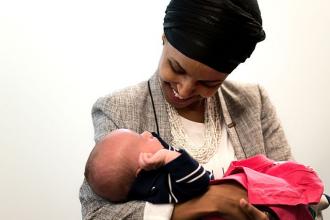The 105-year-old former secretary and stenographer of Nazi propaganda mastermind Joseph Goebbels described her role promoting the evil regime’s war machine as “just another job” in an interview with The Guardian on Monday.
Brunhilde Pomsel — who was one of Goebbels’ five personal assistants — spent more than 30 hours with Guardian reporter Kate Connolly, and their conversations were the source of “A German Life,” which recently premiered at the Munich Film Festival.
Pomsel readily admitted to manipulating statistics of fallen German soldiers, so that the casualty rates wouldn’t appear high to the public. She also said she was tasked with inflating the number of rapes the Red Army had carried out against German women.
One story she told was of being handed the file on Sophie School, an anti-Nazi activist and student who was executed for treason in February 1943, after distributing anti-war fliers at the University of Munich.
“I was told by one of Goebbels’ special advisers to put it in the safe, and not to look at it,” Pomsel stated. “So I didn’t, and was quite pleased with myself that he trusted me, and that my keenness to honor that trust was stronger than my curiosity to open that file.”
“But really, I didn’t do anything other than type in Goebbels’ office,” she said.
To Connolly, Pomsel appeared “unrepentant…it seems as if she even takes something restorative from her insistence that she simply acted the same way as most other Germans.”
In 1942, at the age of 31, Pomsel — who at the time was working as a “well-paid secretary” for the state broadcaster — was transferred to the Ministry of Propaganda, where she worked as a short-hand typist. “Only an infectious disease could have stopped me,” she said. “I was flattered, because it was a reward for being the fastest typist at the radio station.”
Acknowledging that her work for Goebbels is viewed today as a form of abetting the Nazis, Pomsel denied collusion. “I know no one ever believes us nowadays…We knew nothing, it was all kept well secret,” she said. “Those people nowadays who say they would have stood up against the Nazis — I believe they are sincere in meaning that, but believe me, most of them wouldn’t have…the whole country was as if under a kind of spell.”
According to Connolly, when asked about Jews who had suddenly “disappeared,” Pomsel “refuse[d] to admit she was naive in believing that Jews…had been sent to villages in the Sudetenland on the grounds that those territories were in need of being repopulated.”
“We believed it — we swallowed it — it seemed entirely plausible,” Pomsel said.
Pomsel described Goebbels as “short but well kept,” who wore “suits of the best cloth, and always had a light tan.” She recalled his “gentlemanly countenance” and how each morning, when coming into the office, “He’d trip up the steps like a little duke.”
In 1945, with the imminent collapse of the Nazi regime, Pomsel recalled, Goebbels and his entire family were summoned to Nazi leader Adolf Hitler’s underground bunker. “It felt as if something inside me had died. We tried to make sure we didn’t run out of alcohol. That was urgently needed in order to retain numbness,” she said.
Pomsel also described feeling “dumstruck,”upon hearing the news of Goebbels’ suicide and the death of his wife and children.
Today, Pomsel — who lost her sight last year — is “relieved that her days are numbered,” Connolly wrote.
“In the little time that’s left to me — and I hope it will be months rather than years — I just cling to the hope that the world doesn’t turn upside down again as it did then,” Pomsel said, “though there have been some ghastly developments, haven’t there? I’m relieved I never had any children that I have to worry about.”














